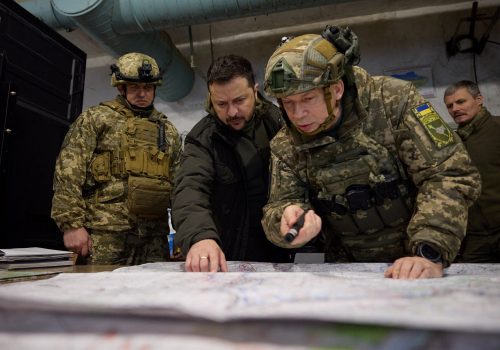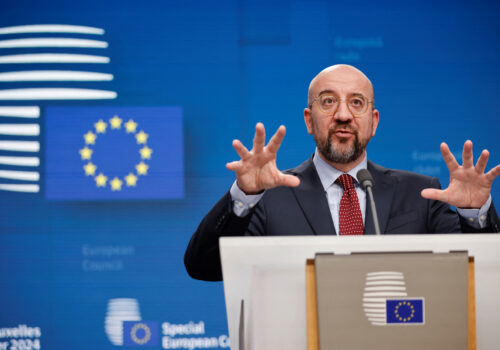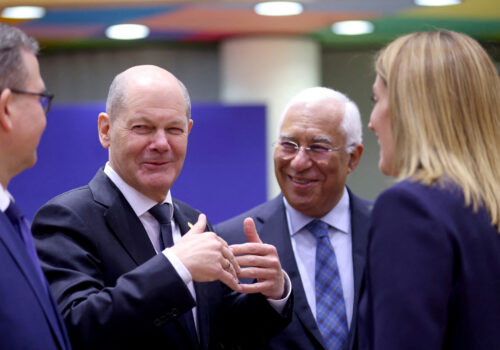Congress must act to stop Kremlin aggression—for the sake of US interests
Are we at the end of an eighty-year period of US global leadership? The United States emerged as a global leader—no, the key global actor—when President Franklin Delano Roosevelt overcame a long tradition of US isolationism by moving forward with the Lend-Lease program that provided essential aid to keep the United Kingdom in the war against Nazi Germany. After World War II, the United States solidified that leadership by playing the decisive role in the creation of interlocking international institutions—such as NATO, the United Nations, the World Bank, and the International Monetary Fund—that provided the basis for an unparalleled period of global and US peace and prosperity.
But big changes sometimes come in small bites—as Americans have been reminded with the failure of a Senate procedural vote on a long-negotiated package deal combining aid to Ukraine, Israel, and Taiwan with a program to fix the crisis at the US border with Mexico. Bundling all these difficult issues was not necessarily a good idea; it was the consequence of the refusal of a small number of Republicans in the House of Representatives to approve aid to Ukraine so long as there was no plan to fix the border. While this was a ploy by that small group to block aid to Ukraine, other representatives and senators in both parties were willing to see if this package might ensure the aid that Ukraine needs to defeat Kremlin aggression. With the failure of Wednesday’s vote, Congress has now spent four months failing to provide Ukraine the assistance that it needs to prevent a Russian victory. If the United States does not act in the next few months, catastrophe will follow.
Helping Ukraine now is the smart and economical way to secure US interests.
This decades-long period of US leadership was possible because of a bipartisan approach based on a sober understanding of the international scene and US interests. That is partly absent now. Due to twenty years of foreign policy failure in the greater Middle East, foreign policy elites no longer enjoy credibility with a significant portion of the American public, largely on the right. Among this cohort, there has also been a renewal of the old isolationist strain that, somehow, the United States is better off fending for itself, rather than working closely with allies and partners to secure its interests. For this group, NATO, if it ever served a purpose (containing the Soviet Union), is no longer needed. Some in this crowd see no major threat to US interests on the global horizon; others see only China in that capacity.
None in this group understand that Russia—the United States’ only peer nuclear adversary—is seeking to undercut US security and prosperity by weakening NATO and the European Union; undermining US allies in Europe and elsewhere; and directly sowing confusion in the United States via election interference and cyber operations. And those who properly see China as the United States’ most dangerous long-term adversary fail to understand that stopping overt Russian aggression now is the best way to deter China’s aggression in the future.
The pointy spear of Kremlin aggression is in Ukraine. If Moscow conquers Ukraine, as both President Joe Biden and House Speaker Mike Johnson have said, the United States may well be forced to directly defend its NATO allies in the Baltic states or Poland from Russian aggression. This will cost far more money than the thirty-eight billion dollars per year that the United States has provided Ukraine since Russia’s full-scale invasion—less than 5 percent of the US defense budget—and may well put US troops in harm’s way. Helping Ukraine now is the smart and economical way to secure US interests.
But, again, a small minority of Republicans in the House do not understand this. The question now rests with Republican leadership in Congress. Senate Republicans such as Minority Leader Mitch McConnell and US Senate Foreign Relations Committee Ranking Member Jim Risch understand the stakes; so does Johnson.
Right now, the Senate is considering a bill that would drop the provision on the border and bundle aid to Ukraine, Israel, and Taiwan. If this bill makes it out of the Senate, all eyes will be on Johnson. Will he put this on the floor of the House, where a majority would make it law? The small group of House Republicans with little understanding of the historic stakes are threatening to defenestrate the speaker if he does that. This is certainly a critical moment of the kind John F. Kennedy catalogued in his 1956 book Profiles in Courage. Failure to provide aid to Ukraine would be a major blow against US leadership; empower US foes in Moscow, Beijing, and Tehran; and, in the end, likely cost the United States in both money and blood.
John E. Herbst is senior director of the Atlantic Council’s Eurasia Center and served for thirty-one years as a foreign service officer in the US Department of State, retiring at the rank of career minister. He was US ambassador to Ukraine from 2003 to 2006.
Further reading
Mon, Feb 5, 2024
The Ukraine imperative for global security
Inflection Points Today By Frederick Kempe
Real success in Ukraine can only come if US leaders across ideological lines remind Americans of history’s enduring lesson: dithering before despots can only produce disaster.
Thu, Feb 1, 2024
Experts react: The EU just approved a 50 billion euro aid package for Ukraine. How will it impact the war?
New Atlanticist By
The breakthrough follows weeks of resistance from Hungary and comes as the two-year mark of Russia’s full-scale invasion of Ukraine draws near.
Thu, Feb 1, 2024
Europe United: EU leaders agree on long-term support package for Ukraine
UkraineAlert By Peter Dickinson
The European Union confirmed a landmark $54 billion aid package for Ukraine on February 1 in Brussels, after EU leaders were able to overcome opposition from Hungary.
Image: House Speaker Mike Johnson (R-LA) speaking just after a vote of the House of Representatives on a new House Speaker, in the House Chamber at the U.S. Capitol. (Photo by Michael Brochstein/Sipa USA)


